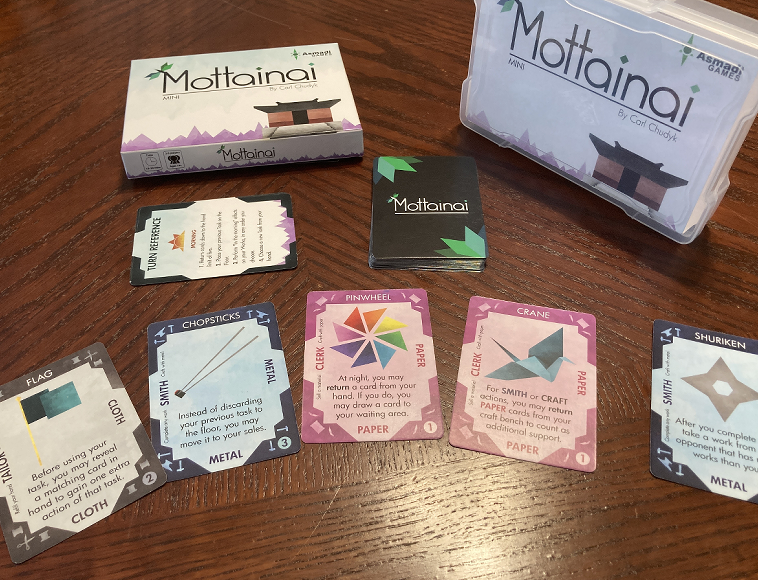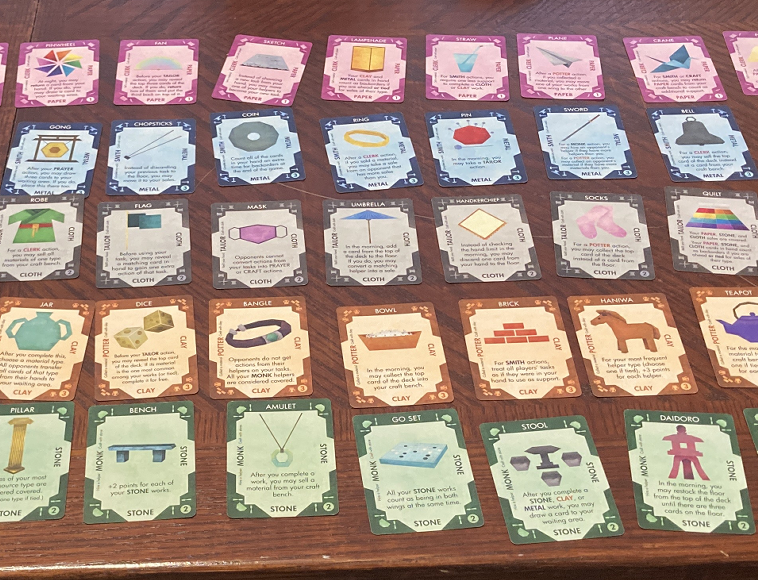I have mixed experiences with Carl Chudyk games. I quite liked Glory to Rome. My opinion on Aegean Sea was brief, concise, and not positive. (Aegean Seas remains to this day, the only board game I have ever ragequit.) So it’s good that Mottainai swings back in the other direction.

I’ve heard Mottainai described as Glory to Rome lite. I agree with some parts of that, and disagree others. For starters, Mottainai uses the same general structure of Glory to Rome. Every thing is card, and each card is everything. For example, a card is an action, crafting material, crafted item, and helper, but not at the same time.
While I won’t go into the full structure of the game, the general gist of Mottainai is as follows: you’re trying to get the most victory points, and you get victory points by crafting items and selling materials. On your turn, you play a card from your hand to take an action, and then copy other players’ actions. These actions can get you more cards, let you craft items for their abilities, or perhaps get helpers, or sell various things.

I’m not sure there’s much value in trying to summarize Mottainai mechanically. It’s not quite an action selection game, but there is some action selection and follow-the-leader sorts of elements. It’s not entirely a tableau builder, but the items you build are both your main source of victory points, while offering additional capabilities.
In that sense, it’s like Glory to Rome. Let’s talk about the ways in which it isn’t.

Probably the biggest difference is that Mottainai takes 20-30 minutes to play, instead of the slog that Glory to Rome can turn into. It’s a much faster game, and while it uses similar structures, it can have a very different mindset to it. Glory to Rome has always felt like building an engine, whereas Mottainai feels much more like looking for lethal in a game of Magic.
Another thing that I find interesting about Mottainai is that as I’ve played more and more with the same few folks, the game has distinctly shifted. Early on, we played like it was necessary to take every action, but as we’ve played more, the pace of the game has slowed down.
Not enough to slow down play, of course. We’ve now played enough that we can resolve turns and actions quickly. But the tempo has shifted down as we’ve recognized that it’s not necessarily to always be firing on full cylinders. Especially because if you take a strong action, your opponents get to take it to… but if you choose to skip an action and just draw a card, your opponents get nothing.
If you liked (or wanted to like Glory To Rome) I highly recommend Mottainai. Or if you’re just curious. It has a bit of grit to it, but once you learn, it’s a fantastic quick game.
